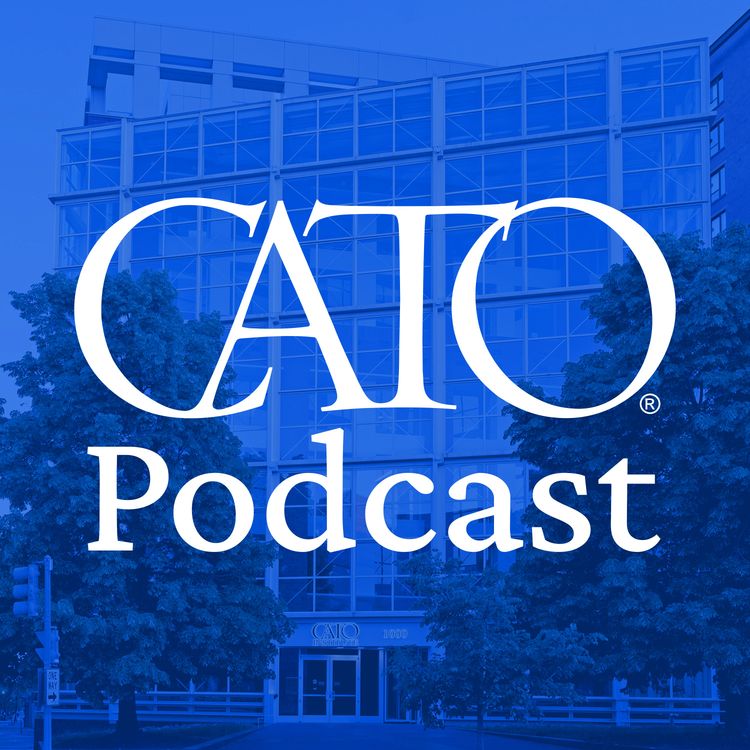Share

Cato Podcast
Challenge Your Narrative & Confront Uncomfortable History
•
History can be a weapon. Obscuring inconvenient history can be a weapon. And Left and Right are both guilty of it. Phil Magness provides some helpful examples.
More episodes
View all episodes

9. SCOTUS Roundup
32:40||Ep. 9Thomas A. Berry and Brent Skorup analyze five major Supreme Court cases from the recently concluded term, describing it as a "mixed bag" with more government victories than libertarians would prefer. They discuss key decisions including Free Speech Coalition v. Paxton (upholding Texas age verification requirements for adult content), Trump v. Casa Inc. (ending universal injunctions by federal judges), and several other significant rulings on transgender rights and religious liberty in schools.
8. The Good, The Bad and the Beautiful
35:36||Ep. 8Adam Michel, Michael Cannon, and Dominik Lett break down the One Big Beautiful Bill. Is it $3.4 trillion, or actually $6 trillion? Is Medicaid getting a cut or a trim? With spending cuts pushed to later years and tax benefits front-loaded, the scholars dissect the political calculations and baseline accounting that shaped this massive piece of legislation.Show Notes:Michael F. Cannon, Krit Chanwong, and Dominik Lett, "Congress Must Cut and Reform Medicaid" cato.org, April 28, 2025Domink Lett, "The Senate’s Big Beautiful Blunder Could Increase the Debt by $6 Trillion" cato.org, July 2, 2025Adam Michel, "A Fiscal Hawk’s Defense of the GOP’s Deficit-Busting Budget Bill" cato.org, July 10, 2025
7. Cato Cage Match: Education vs. Health Care
33:10||Ep. 7Michael F. Cannon and Neal McCluskey let us listen in on their ongoing 20-year debate over who has the more difficult job -- fixing health care or education. McCluskey argues that government's monopolistic control over K-12 education and compulsory schooling creates a more fundamental threat to freedom, while Cannon contends that health care is even more dysfunctional due to cascading government interventions that have created the world's most expensive and gap-ridden health system. Both scholars explore how government subsidies drive up costs in their respective sectors and outline their visions for more libertarian, market-based alternatives.Show Notes:https://www.cato.org/free-society/summer-2025/federal-failure-parental-freedom-story-movement https://www.cato.org/blog/supreme-court-right-reading-opt-outs-thats-not-enough https://www.cato.org/blog/top-5-reasons-end-us-department-education
6. Aimless Rivalry: U.S. and China in the Middle East
24:30||Ep. 6Justin Logan and Jon Hoffman delve into Hoffman's latest policy analysis, "Aimless Rivalry: The Futility of U.S. China Competition in the Middle East." They debunk justifications for U.S. Middle East policy based on competition with China and challenge prevailing narratives in international relations. Tune in for a thorough discussion that puts threats in context and examines U.S. policy through a skeptical lens.Show Notes:Jon Hoffman, "Aimless Rivalry: The Futility of US–China Competition in the Middle East" Policy Analysis No. 1000, July 10, 2025Justin Logan, “Why the Middle East Still Doesn’t Matter,” Politico Magazine, October 9, 2014 Justin Logan, “The Case for Withdrawing from the Middle East,” Defense Priorities, September 30, 2020 Justin Logan, “Middle East Security,” Cato Handbook for Policymakers, 9th Edition, 2022Jon Hoffman, "The U.S. Has Nothing to Fear from China in the Middle East" World Politics Review, December 6, 2023Jon Hoffman, “U.S.-China competition and the value of Middle East Influence” Defense Priorities, June 10, 2025
5. Stablecoins and the Fight for a Level Playing Field
29:14||Ep. 5What are stablecoins, how do they work, and what does the future hold for these innovative financial instruments? Join Norbert Michel and Jennifer Schulp from the Cato Institute's Center for Monetary and Financial Alternatives as they delve into the evolving landscape of stablecoin legislation. Whether you're a seasoned crypto enthusiast or just curious about digital currencies, this discussion will provide valuable insights into the regulatory environment and the potential impacts on the financial system.Show Notes:Jennifer J. Shculp, "Stablecoin Bills Galore, but How Do They Stack Up?", cato.org, February 27, 2025Jennifer J. Schulp, "Stablecoin Legislation Must Ensure Financial Privacy", CoinDesk, April 24, 2025Norbert Michel, "The GENIUS Act Is a Good Start, But Congress Could Make It Smarter", Forbes, June 4, 2025Jennider J. Schulp and Eleanor Mueller, "Stablecoins, Market Structure, and More – Evaluating the Crypto Legislative Landscape", Cato Institute Live Event, June 17, 2025
4. The Rise and Fall of DOGE 1.0
28:09||Ep. 4In this episode, Alex Nowrasteh and Ryan Bourne delve into the intriguing journey of Doge 1.0 under Donald Trump's administration. From Elon Musk's ambitious overhaul to the eventual departure of key figures, they explore the chaotic, amusing, and concerning facets of this government efficiency experiment. With insights into the economic impacts, legislative hurdles, and potential future in Doge 2.0, this discussion sheds light on the complexities of attempting a bureaucratic revolution. Join Alex and Ryan as they dissect the promises, failures, and hopes of a libertarian downsizing dream.Show Notes:Alex Nowrasteh and Ryan Bourne, "Cato Institute Report to the Department of Government Efficiency (DOGE)" White Paper, December 11, 2024Ryan Bourne and Alex Nowrasteh, "Small-Government Conservatives Should Give DOGE a Chance" The Dispatch, December 30, 2024Ryan Bourne and Alex Nowrasteh, "DOGE Can’t Just Trim Waste. It Has to Cut Government — A Lot" U.S. News & World Report, January 7, 2025Ryan Bourne, "DOGE: Efficiency Requires Elimination" The War on Prices, March 14, 2025Alex Nowrasteh and Ryan Bourne, "Six Ways to Understand DOGE and Predict Its Future Behavior" cato.org, March 17, 2025Ryan Bourne, "Does DOGE Show That There’s Little Government Waste?" The War On Prices May 9, 2025
3. Misinformation in the Age of AI
31:04||Ep. 3Is misinformation really a new crisis—or just the latest chapter in a centuries-old debate over truth, speech, and power? In this episode, Cato Institute’s Jennifer Huddleston and David Inserra unpack the cultural and policy panic surrounding misinformation and disinformation in the age of AI, deepfakes, and viral tweets. Who should decide what counts as truth online? Plus, why humility, media literacy, and a competitive internet might be better solutions than censorship.Show Notes:Jennifer Huddleston, "AI and the Future of Our Elections" Testimony, September 27, 2023Jennifer Huddleston and David Inserra, "Oversight Board Comment on Misinformation and Manipulated Media: The Importance of Free Expression in the Debate over Misinformation" cato.org, October 25, 2023Jennifer Huddleston, "The Rush to Regulate AI Coule be the Death of Parody" National Review (Online), January 26, 2024David Inserra and Jennifer Huddleston, "Actually, Tim Walz, the First Amendment Does Protect Misinformation and ‘Hate Speech’" National Review, August 11, 2024Jennifer Huddleston and Emma Hopp, "What the Past Can Teach Us about Our AI Fears" Reason, October 29, 2024David Inserra and Brent Skorup, "Comments in Response to FCC “Delete, Delete, Delete” Initiative" cato.org, April 11, 2025David Inserra, "The Misleading Panic over Misinformation" Policy Analysis No. 999, June 26, 2025
2. The Illusion of Financial Privacy
26:05||Ep. 2Is your financial life really private? In this eye-opening episode, Cato Institute's Norbert Michel and Nicholas Anthony take us deep into the world of financial surveillance, starting with the 1970 Bank Secrecy Act. What was originally sold as a tool to catch tax cheats has quietly evolved into a sprawling system of government oversight—with banks and financial institutions acting as unwitting watchdogs. From suspicious activity reports to the third-party doctrine, Norbert and Nicholas explain how the erosion of Fourth Amendment protections has happened largely out of public view. They break down the law’s legacy, how it expanded post-9/11, and why $10,000 isn’t the large sum it once was. But there's reason for optimism. With growing public awareness, privacy-focused tech, and new reform legislation finally on the table, change might be within reach. If you thought your bank account was your business, think again—this episode will make you see it in a whole new light.Show Notes:Norbert Michel and Jennifer J. Schulp, "Revising the Bank Secrecy Act to Protect Privacy and Deter Criminals" Policy Analysis No. 932, July 26, 2022Nicholas Anthony, "The Right to Financial Privacy" Policy Analysis No. 945, May 2, 2023Norbert Michel, "The Bank Secrecy Act Is a Bigger Threat than FISA" Forbes, April 17, 2024Nicholas Anthony and Naomi Brockwell, "The Illusion of Financial Privacy" Reason.com, May 30, 2024
1. One Big Beautiful Podcast
28:14||Ep. 1In this episode, Cato Institute's Scott Lincicome and Adam Michel dive deep into the sweeping new legislation—dubbed "The One Big Beautiful Bill"—moving through Congress. They break down what’s at stake as key provisions of the 2017 tax reform are set to expire, unpack the bill’s complex mix of tax cuts, new carve-outs, and industrial subsidies, and examine why temporary tax policy and policy uncertainty could derail economic growth. Plus, they confront the fiscal fiction behind tariffs as a reliable revenue source and make the case for a cleaner, more permanent pro-growth tax system. If you're looking for a sharp, honest take on where tax and trade policy stand in 2025—and where they should go—this one’s for you.Show Notes:Adam Michel, "Republicans’ One, Big, Beautiful Tax Bill Needs a Makeover" Cato.org, May 14, 2025Adam Michel, "Four Things the Senate Can Do to Improve the House Tax Bill" Cato.org, May 22, 2025Scott Lincicome, "Republicans Can’t Pay for Their Tax Cuts with Fantasy Revenue Sources" The Washington Post, May 27, 2025Scott Lincicome, "Trump’s Latest Tariff Idea Is Dangerously Foolish" The Dispatch, June 19, 2025Adam Michel, "Senate Big Beautiful Bill: More Growth, More Subsidies, More Debt" Cato.org, June 30th, 2025